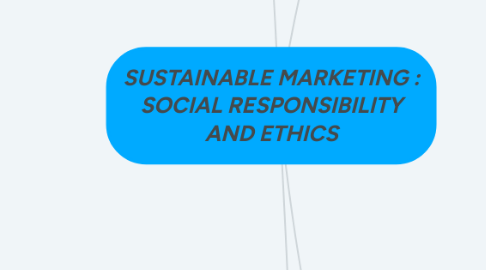
1. CONSUMER ACTIONS TO PROMOTE SUSTAINABLE MARKETING
1.1. CONSUMERISM
1.1.1. An organised movement of citizens and government agencies designed to improve the right and power of buyers in relation to seller.
1.1.1.1. seller's right
1.1.1.1.1. the right introduce any product in any size and style
1.1.1.1.2. right to charge ant price for the product
1.1.1.1.3. right to spend any amount to promote the product
1.1.1.2. buyer's right
1.1.1.2.1. right to not buy a product that is offered for sale
1.1.1.2.2. the right to expect the product to be safe
1.1.1.2.3. right to expect the product to performs as claimed
1.2. ENVIRONMENTALISM
1.2.1. An organised movement of concerned citizens, businesses and government agencies to protect and improve people's living environment
1.2.1.1. Environmental sustainability
1.2.1.1.1. involves earning profits while helping to save the planet.
2. BUSINESS ACTION TOWARD SUSTAINABLE MARKETING
2.1. SUSTAINABLE MARKETING PRINCIPLE
2.1.1. Consumer oriented marketing
2.1.1.1. company should view marketing activities from the consumer point of view
2.1.1.2. deliver superior value to the customer
2.1.2. Consumer value marketing
2.1.2.1. company should put most of its resources into customer value-building marketing investments.
2.1.2.2. invest in customer value building marketing
2.1.2.3. create value FOR customers
2.1.2.4. many things marketers do
2.1.3. Societal marketing
2.1.3.1. a company should make marketing decision by considering consumers wants, the company requirements, consumers long run interests and society long run interest.
2.1.3.1.1. deficient product
2.1.3.1.2. pleasing product
2.1.3.1.3. salutary product
2.1.3.1.4. desirable product
2.1.4. Sense of mission marketing
2.1.4.1. a company should defined its mission in broad social terms rather than narrow product.
2.1.5. Innovative marketing
2.1.5.1. a company should seek real product and marketing improvement
2.1.5.2. company should building better products and technologies
2.2. MARKETING ETHICS
2.2.1. dimension of social responsibility that involves principles and standards the define acceptable conduct in marketing
2.2.1.1. the sustainable company
2.2.1.1.1. sustainable company are those that create value for customer through socially, environmentally and ethically responsible actions.
3. SUSTAINABLE MARKETING
3.1. Is socially and environmentally responsible marketing
3.2. meets the present need of consumers and businesses
3.3. preserving or enhancing the ability of future generation to meet their needs
4. SOCIAL CRITICISMS OF MARKETING
4.1. MARKETING'S IMPACT ON INDIVIDUAL CONSUMERS
4.1.1. POOR SERVICES TO DISADVANTAGED CONSUMERS
4.1.1.1. Complaint
4.1.1.1.1. american marketers serve disadvantaged customers poorly.
4.1.1.2. Responses
4.1.1.2.1. some marketers profitably target these customer and the FTC has taken action against marketers that do.
4.1.2. TOO FEW SOCIAL GOODS
4.1.2.1. Complaint
4.1.2.1.1. businesses oversell private goods at the expense of public goods.
4.1.2.2. Responses
4.1.2.2.1. there needs to be a balance between private and public goods.
4.1.3. PLANNED OBSOLESCENCE
4.1.3.1. Complaint
4.1.3.1.1. producers cause their products to becomes obsolete.
4.1.3.2. Responses
4.1.3.2.1. planned obsolescence is really the result of competitive market.
4.1.4. SHODDY, HARMFUL AND UNSAFE PRODUCTS
4.1.4.1. Complaint
4.1.4.1.1. product have poor quality, provide little beneifts and can be harmful.
4.1.4.2. Responses
4.1.4.2.1. good marketers realise there is no value in marketing shoddy, harmful or unsafe products.
4.1.5. HIGH PRESSURE SELLING
4.1.5.1. Complaint
4.1.5.1.1. salespeople use high-pressure selling that persuades people to buy goods they had to intention of buying.
4.1.5.2. Responses
4.1.5.2.1. most selling involves building long-term relationships with valued customers. High-pressure or deceptive selling can damage these relationship.
4.1.6. DECEPTIVE PRACTICES
4.1.6.1. Complaint
4.1.6.1.1. companies use deceptive practice that lead customer to believe they will get more value than they actually do.
4.1.6.2. Responses
4.1.6.2.1. support legislation to protect consumer from deceptive practice.
4.1.7. HIGH PRICES
4.1.7.1. Complaint
4.1.7.1.1. prices are too high due to high cost of distribution, advertising, promotion and excessive marks-ups
4.1.7.2. Responses
4.1.7.2.1. intermediaries are important and offer value.
4.1.7.2.2. advertising informs buyers of availability and merits of a brand.
4.1.7.2.3. consumers don't understand the cost of doing business.
4.2. MARKETING'S IMPACT ON SOCIETY AS A WHOLE
4.2.1. False want and too much materialism
4.2.2. Too few social goods
4.2.3. Cultural pollution
4.2.4. Too much political power
4.3. MARKETING'S IMPACT ON OTHER BUSINESSES
4.3.1. Acquisitions of competitiors
4.3.2. Marketing practices that create barriers to entry
4.3.3. Unfair competitive marketing practices

